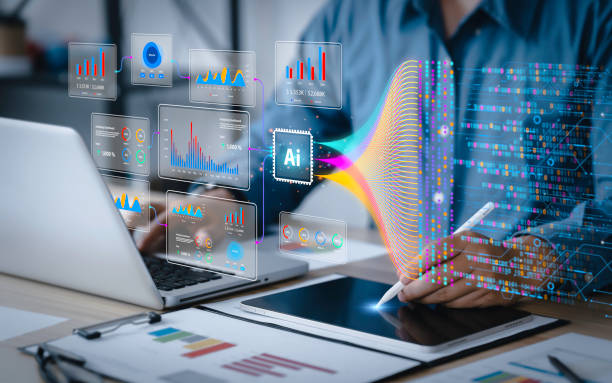THE FUTURE OF STOCK TRADING : HOW DIGITAL PLATFORMS ARE TRANSFORMING INVESTMENTS?
undefined
1. AI and Algorithmic Trading: Automating Investments

Artificial intelligence (AI) and machine learning (ML) have significantly impacted digital trading platforms, making trading more data-driven and automated. AI-powered algorithms can analyze market trends, execute trades in real time, and optimize portfolios based on predictive analytics.
How AI is transforming online investing: •Faster data analysis – AI processes large amounts of market data within seconds, identifying profitable trades. •Automated trading strategies – AI bots execute buy/sell orders without human intervention. •Risk management – AI-based models help traders minimize losses by forecasting market trends. Thanks to AI, stock market apps like MetaTrader, QuantConnect, and TradeStation are providing traders with powerful automation tools to enhance their investment strategies.
2. Stock Market Apps: Investing Anytime, Anywhere
The rise of stock market apps has made online investing more convenient than ever. Fintech companies like Robinhood, Webull, and eToro have democratized access to the stock market, allowing users to trade from their smartphones with just a few taps.
Key features of stock market apps: •Zero-commission trading – Many apps eliminate brokerage fees, making investing cost-effective. •User-friendly interfaces – Simplified dashboards help beginners navigate trading easily. •Fractional shares – Investors can buy portions of expensive stocks, increasing accessibility. With mobile-friendly interfaces and real-time updates, digital trading platforms are empowering a new generation of investors.
3. Blockchain and Tokenized Assets: The Future of Transparency
Blockchain technology is revolutionizing digital trading platforms by improving security, transparency, and efficiency in the stock market. Traditional trading involves intermediaries, causing delays and higher transaction costs. Blockchain eliminates these inefficiencies by enabling peer-to-peer (P2P) transactions.
How blockchain is transforming stock trading: •Faster settlements – While traditional stock trades take days to settle, blockchain-based transactions are completed in minutes. •Enhanced security – Decentralized ledgers reduce the risk of fraud and hacking. •Tokenized assets – Stocks can be converted into digital tokens, enabling fractional ownership and broader market participation. With blockchain, the stock market is moving toward decentralized exchanges, reducing reliance on traditional financial institutions.
4. Social and Copy Trading: Learning from Experts

Social trading has become a major trend in online investing, allowing beginners to learn from experienced traders. Platforms like eToro and ZuluTrade offer copy trading, where users can mirror the strategies of top-performing investors.
Why social trading is gaining popularity: •Transparency– Investors can view and analyze the performance of expert traders. •Automation – Users can automatically replicate successful trades in their portfolios. •Community engagement – Investors can share insights, strategies, and market trends. By integrating social trading,digital trading platforms are making investing more interactive and educational.
5. Robo-Advisors: AI-Powered Investment Management
The rise of robo-advisors is transforming the wealth management industry. These AI-driven Fintech solutions provide automated investment management, offering personalized portfolios based on risk tolerance and financial goals. Benefits of robo-advisors in digital trading platforms: •Lower fees – Robo-advisors charge significantly less than human financial advisors. •Emotion-free investing – Automated strategies prevent impulsive trading decisions. •Portfolio rebalancing – AI continuously adjusts asset allocations for optimal returns. Popular Fintech platforms like Wealthfront, Betterment, and M1 Finance are making AI-powered online investing accessible to both beginners and experienced traders.
6. Decentralized Finance (DeFi) and Peer-to-Peer Trading
Decentralized finance (DeFi) is disrupting the stock market by eliminating traditional brokers and enabling peer-to-peer (P2P) trading. Built on blockchain technology, DeFi platforms offer a more transparent and cost-efficient way to trade stocks.
How DeFi is reshaping digital trading platforms: •Lower transaction costs – Eliminates middlemen, reducing trading fees. •Greater transparency – All transactions are recorded on an immutable blockchain ledger. •Global access – Investors from around the world can trade without restrictions. As DeFi continues to evolve, we may see fully decentralized stock exchanges, transforming how online investing is conducted.
7. Big Data and Predictive Analytics: Smarter Investments.

The use of big data and predictive analytics is helping investors make more informed decisions on digital trading platforms. AI-driven tools analyze financial reports, news sentiment, and market patterns to identify profitable opportunities.
How predictive analytics enhances stock market trading: •Market sentiment analysis – AI scans social media and news to gauge investor sentiment. •Risk assessment – Predictive models alert traders to potential market downturns. •Personalized stock recommendations – AI suggests investment opportunities based on user behavior. By leveraging big data,stock market apps are offering more intelligent and customized investment insights.
8. Regulatory Changes and Cybersecurity in Fintech

As Fintech and digital trading platforms continue to expand, financial regulators are implementing stricter policies to protect investors. Governments are also enforcing cybersecurity measures to prevent fraud and hacking incidents.
Key regulatory developments in stock trading: •Stronger KYC (Know Your Customer) and AML (Anti-Money Laundering) rules to prevent financial crimes. •Enhanced data privacy laws to protect user information. •Stricter oversight of high-frequency trading to prevent market manipulation. As the Fintech industry evolves, regulatory frameworks will continue to adapt to ensure online investing remains secure and transparent.
The Future of Stock Trading: What’s Next?
The stock market is evolving into a fast, accessible, and technology-driven environment. With AI, blockchain, and big data,digital trading platforms are making investing more efficient than ever.
What to expect in the next decade:
•Quantum computing in trading – Faster processing for complex market predictions. •AI-powered investment advisors – Real-time, personalized portfolio management. •Wider adoption of decentralized stock exchanges – More blockchain-based trading platforms. - Enhanced cybersecurity measures – Stronger protection for investors’ funds and data. Technology is shaping the future of the stock market, making online investing more inclusive, intelligent, and secure. Whether you’re a beginner or an experienced trader, now is the perfect time to embrace Fintech-driven stock trading.
